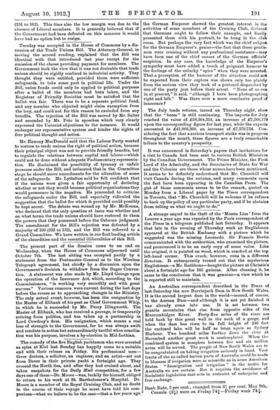Tuesday was occupied in the House of Commons by a
dis- cussion of the Trade Unions Bill. The Attorney-General, in moving the second reading, explained that the Bill was identical with that introduced last year except for the omission of the clause providing payment for members. The Government took the view that it was not desirable that trade unions should be rigidly confined to industrial activity. They thought they were entitled, provided there were sufficient safeguards, to take some part in political life. Under the Bill, union funds could only be applied to political purposes after a ballot of the members had been taken, and the Registrar of Friendly Societies must be satisfied that the ballot was fair. There was to be a separate political fund, and any member who objected might claim exemption from the levy, and could not for this reason be excluded from any benefits. The rejection of the Bill was moved by Mr. Salter and seconded by Mr. Peto in speeches which very clearly expressed the Unionist objections to the measure. It would endanger onr representative system and hinder the rights of free political thought and action.


































 Previous page
Previous page